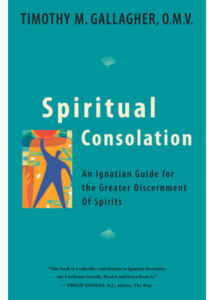 Summary: A discussion of the second set of “Rules of Discernment” by Ignatius.
Summary: A discussion of the second set of “Rules of Discernment” by Ignatius.
In Ignatius’ classic Spiritual Exercises, a guide for spiritual directors to give a 30-day retreat, Ignatius has a number of annotations or suggestions for spiritual directors. Some of the most helpful and discussed are his Rules of Discernment. These rules guide understanding whether something is from God or satan (or at least a distraction from God.) Ignatius’ rules are split into two groups. The first group is discussed in Gallagher’s earlier book The Discernment of Spirits. Spiritual Consolation discusses the second set of rules.
The second set of rules primarily focuses on spiritual consolation and desolation and how the more mature believer may be tempted by satan differently than a less mature believer might. The central insight in my mind is that generally, satan seems to tempt less mature Christians by desolation, making them question God or their path. But in this second set of rules, Ignatius focuses on the idea that satan tempts more mature Christians by placing additional good opportunities or ideas in their path to distract them from the better option.
One example in the book is a deacon who has come to a new parish, helping it clean up its finances, become more focused in ministry, do fundraising, etc. But as he is there for a while, he realizes that the youth programs are inadequate, and no one takes a genuine interest in youth and their discipleship. So, he considers whether to stop his work with administration and finance and refocus his time on youth. It is not that either is wrong. Both may be what God is calling him to. Either adding too much onto your plate so you cannot do well or working on both, but losing time and energy for personal devotion and prayer is a bad long-term result.
The point of rules of discernment, especially this second set, is that God has a plan for you and is trying to guide us to be more aware of his presence. But satan (or more generally, sin and temptation) regularly tempts us away from the better path. Ignatius does not suggest that there is only one path; if we veer off of it, we are lost. There are good, better, and sometimes awful options, but God can work for our good even if we choose less good options. However, trying to stay on a path that is the right one and hearing from God is what we should strive for most of the time.
I really disagree at points with Gallegher, especially around satan’s ability to mimic God’s consolation. I think that what satan is doing is mimicking but not actually giving real consolation. Gallegher suggests that satan is giving real consolation but without the long-term benefits of God’s consolation. I do not know how much of this is my theological disagreement with Gallegher because he is Catholic and I am Protestant or how much other Catholics may also disagree. Because I read this for a class, I can say that most Catholics in my class also seemed to find Gallagher’s position concerning.
Overall, I think this is too technical for most people who do not have a strong interest in Ignatius’ Rules of Discernment. That being said, I think this quote is correct:
For persons in the second spiritual situation, simply to know that the enemy may attempt to deceive under the appearance of good is already an enormous gift. Conscious that deception is possible precisely in their spiritual energy, they understand the value of the “greater discernment” that Ignatius teaches in these rules. And when, through ongoing spiritual awareness and with the aid of their guides, they assimilate these eight rules in practice, they are effectively prepared to unmask and to reject the “hidden deceits” of the enemy. With joyful and serene confidence, they will “grow and rise from good to better” in the service of the Lord they love.
Spiritual Consolation: An Ignatian Guide for Greater Discernment of Spirits by Timothy Gallagher Purchase Links: Paperback, Kindle Edition